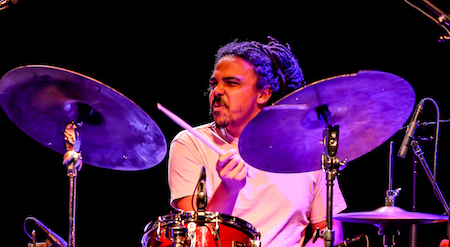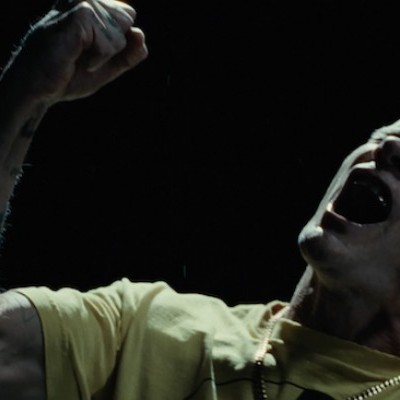Dec 9, 2025 12:28 PM
In Memoriam: Gordon Goodwin, 1954–2025
Gordon Goodwin, an award-winning saxophonist, pianist, bandleader, composer and arranger, died Dec. 8 in Los Angeles.…

Asher Gamedze
(Photo: Roland Owsnitzki)JazzFest Berlin returned this year after a two-year, pandemic-induced absence. This year’s 58th edition offered 43 shows Nov. 3–6 as several programmatic themes ran and intersected in fascinating manners, particularly inside the stately Haus der Berliner Festspiele.
A focus on folkloric traditions, identity and resistance was one of the most engrossing themes that resonated Saturday night inside the venue’s main theater. Drummer and bandleader Asher Gamedze demonstrated why South Africa remains a hot spot in the cosmopolitan jazz eco-system. The country already has an established jazz legacy of great renowned. With his quartet, Dialectic Soul, he conveyed how modern and vibrant 21st century jazz is in home country, even while bolstering his music in post-bop and post-modal vein.
Gamedze’s rhythmic sensibility throughout the set conveyed dancing, either through his subtle foot work, ride cymbal patterns or the infectious grooves he concocted on the snares and toms. He steered the ensemble with a forceful yet unobtrusive momentum and clarity that at times recalled Jack DeJohnette. The quartet’s frontline horn duo – tenor saxophonist Robin Fassie-Kock and Buddy Wells – delivered pensive harmonies and soaring melodies that are sometimes endemic in South African jazz – but respective their improvisations burst with fresh, cogent ingenuity. Bassist Thembinkosi Mavimbela brought a lissome, blues vibe as he helped Gamedze propelled the ensemble; he also delivered the set’s most mesmerizing solo that combined tender melodic singing and a fluid, hymnal-like improvisation.
In response to Russia’s war on Ukraine, the JazzFest Berlin-commissioned Komпoussulă continued the folkloric themes. Composed of nine musicians hailing from Ukraine, Poland, Romania, Turkey, France, Belgium, and Australia, the ensemble wove folkloric music from the Ukraine and other Black Sea regions and imbued them with Ornette Coleman’s Harmolodic vitality. They began their set with a haunting vocal piece that featured eight of the musicians singing, while Samuel Hall accompanied on drums. Soon after, the rest of the members took their respective instruments then under the guidance of pianist Kateryna Ziabliuk, unraveled a transportive set of folkloric tunes that incorporated traditional Polish percussion, Gesang vocals and live electronics, among conventional instruments. The results were gripping, even if language barriers hindered one’s full understanding of the songs.
Soon after, saxophonist, composer and conceptualist Matana Roberts transported the audience to the United States’ Deep South with the European premiere of “COIN COIN: Chapter Four: Memphis.” With her six-piece ensemble, Roberts constructed evocative abstractions laced with blues, country, Native American rhythms, gospel, and southern rock — all transfigured through modern avant-garde jazz tipped off with theatrical flair as she and a few other musicians intersected the music by shuffling a deck of cards or rolling dice. “Chapter Four: Memphis” is part of extensive 12-part series Roberts has been developing. This one involves her maternal roots in Memphis and tells the story of a biracial girl who flees into the woods after her parents are murdered by the Ku Klux Klan. With its cinematic yet dreamlike splendor and Roberts’ charismatic recitations, “COIN COIN: Chapter Four” was an emotional highpoint at this year’s JazzFest Berlin.
Similar touchstones from Roberts performance, however, appeared the following night during Ben Lamar Gay Ensemble’s presentation, “Open Arms To Open Us.” Both Roberts and Gay developed their voices in Chicago’s vibrant avant-garde scenes. His band too were prone to concocting murky textures, brimming with stylistic threads from electronic music, hip-hop, soul, blues and Art Ensemble of Chicago-inspired free-jazz. Whether he was playing taunt improvisations through his cornet, chiming hypnotic rhythms using bells and other tiny percussion, fashioning electronic-drenched muddy waters, or belting out blues-drenched vocal shouts and chats, Gay never ceased to enthrall. Matt Davis’ molasses-thick tuba rhythms and Tommaso Moretti’s pulverizing drumming kept the velocity moving forward while guitarist Edinho Gerber crafted intricate textures and rhythms that meshed well with Gay’s droning synths.
Another thematic delight occurred on Friday night with “Umpire Jumble,” in which the festival producers reconfigured the main stage for three hours that allowed attendees to gather, swarm, and writhe around performances from the Paris-Berlin Umlaut Collective; the French-Italian-German quartet, Die Hochstapler; and a trio performance from clarinetist Rüdiger Carl, bassist Joel Grip, and the legendary Swedish drummer Sven-Åke Johansson, who served as the festival’s artist-in-residence. Opening up the space between performance and audience made for an intimate affair, allowing listeners greater insight into the mechanics involving in creative music-making.
“It’s a privilege to work in such a place,” said Nadin Deventer, JazzFest Berlin’s artistic director when explaining the goals behind turning the theater main stage inside out. “But it’s also a challenge for this kind of music. [In] this very formal setting, [the] audience is far away. I’m constantly in dialog with the theater. There is an obstacle for younger people to enter theater and we try really to pull it all open. We are always communicating and playing with this room.” DB

Goodwin was one of the most acclaimed, successful and influential jazz musicians of his generation.
Dec 9, 2025 12:28 PM
Gordon Goodwin, an award-winning saxophonist, pianist, bandleader, composer and arranger, died Dec. 8 in Los Angeles.…

Belá Fleck during an interview with Fredrika Whitfield on CNN.
Jan 13, 2026 2:09 PM
The fallout from the renaming of the John F. Kennedy Center for the Performing Arts to include President Donald…

The success of Oregon’s first album, 1971’s Music Of Another Present Era, allowed Towner to establish a solo career.
Jan 19, 2026 5:02 PM
Ralph Towner, a guitarist and composer who blended multiple genres, including jazz — and throughout them all remained…

Flea has returned to his first instrument — the trumpet — and assembled a dream band of jazz musicians to record a new album.
Dec 2, 2025 2:01 AM
After a nearly five-decade career as one of his generation’s defining rock bassists, Flea has returned to his first…

Rico’s Anti-Microbial Instrument Swab
Jan 19, 2026 2:48 PM
With this year’s NAMM Show right around the corner, we can look forward to plenty of new and innovative instruments…